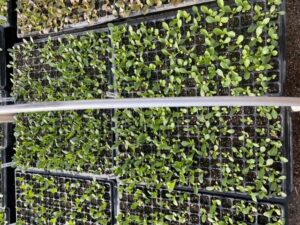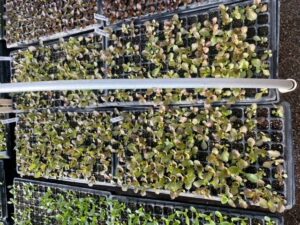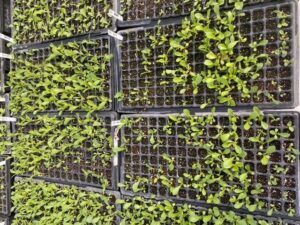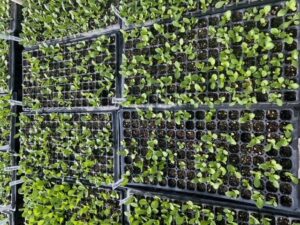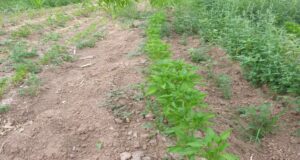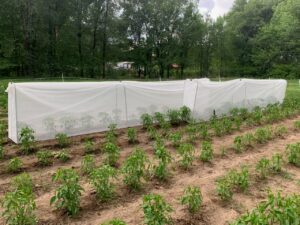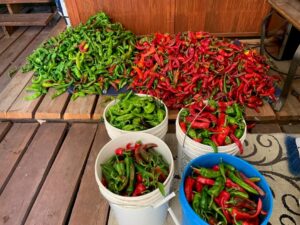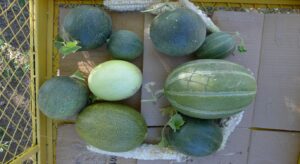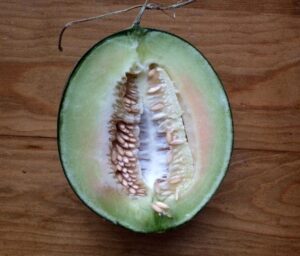Project Overview
Commodities
- Vegetables: cucurbits, greens (lettuces), peppers
Practices
- Crop Production: multiple cropping, plant breeding and genetics, seed saving, varieties and cultivars
- Education and Training: decision support system, demonstration, extension, farmer to farmer, networking, on-farm/ranch research, participatory research, workshop
- Sustainable Communities: ethnic differences/cultural and demographic change, local and regional food systems, quality of life, social capital, sustainability measures, values-based supply chains
Abstract:
Practicing sustainable agriculture requires using less outside inputs and reducing environmental impact. In order to achieve this balance of productivity and resource frugality, a level of adaptiveness is demanded from both the crop and the farmer. For many vegetables grown in the U.S., generations of farmers saving their own seed resulted in the production of landrace varieties. These unique crops have evolved through selections made by the grower to promote tolerance to many stresses faced in a specific region. Currently, many of our efforts to publicly breed new vegetable varieties are focused on one location or institution, neglecting the diverse landscapes and climates that do not match these breeding sites. In addition, institutional breeding focuses on larger growers, and the cultural methods involved in large-scale production. These conditions are not the same for the small farmer, who grows for local markets and small food distributors. Many farmers in New Mexico are serving these small communities and are residing in different elevations and climatic conditions. We are proposing an initiation of the New Mexico Participatory Vegetable Breeding Program. The purpose of this project will be to educate and cooperate with small vegetable producers in New Mexico to create breeding and seed-saving operations on their own farms. The endeavor will help to increase and preserve diversity of crops grown in the state, as well as breed for hardiness in locally-adapted vegetables. This project aims to promote cultural heritage and local food economies through an innovative approach to plant breeding.
Project objectives:
1. Development of breeding plans at each participant farm (Year 1)
Each farm/farmer focuses on specific needs for their respective crop. Thus, decisions need to be made with consideration of the land, cultural farming methods, and climate pertaining to each location. Farm visits will be conducted by the PI to discuss breeding goals and to take initial observations of the focus crops.
Outcome: Detailed plans for each farm indicating planting design, breeding workflow, data collection, and seed-saving strategies.
2. Implementation of breeding plans (Years 2 & 3)
This objective involves performing the annual process of planting, observing, selecting the best performers on the farm and in replicated field trials, seed-saving, and overall assessment of the growing season.
Outcome: Increased self-sufficiency of the farmer with on-farm breeding skills. Seed obtained from plant selections for continuation of breeding plan.
3. Education, outreach, and dissemination of results (Years 2 & 3)
A workshop for basic breeding techniques will be given for all farmer participants at the end of the first year, during the annual New Mexico Sustainable Agriculture Conference in December. Presentations will be made about current status and updates during a special session at this conference at the end of years 2 and 3. Distribution of brochures pertaining to the project will be done at public events such as the NM Sustainable Agriculture Conference, farmer’s markets and field days. Social media content describing the process and benefits of the program will be developed and released to the public. Field days given at an NMSU Agricultural Experiment Stations will showcase the variety trials being done for the project.
Outcome: An increased awareness across agricultural professionals and the general public about participatory vegetable breeding and the importance of locally-adapted vegetables.
Overview (Year 1)
This report outlines the research outcomes accomplished in the first year of the “Initiation of a New Mexico Participatory Vegetable Breeding Program.” The overall goal for this year focused on planning and assessment of farmer breeding goals, and initial plant selections. This work will progress the mission of increasing environmental adaptation and farmer autonomy with seed. During the spring and summer months of 2020, farm visits were carried out by PI’s Bradley Tonnessen and Charles Havlik. The visits pertained to planning of breeding projects in a 3-year model, as well as assessing the scale of work limited by labor, time, and space for each participant’s farmland. Plant breeding equipment was provided for each farmer as well, including cloth seed cages for genetic isolation of plant selections. Following these visits, farmers were in regular contact with the PI, and the proper collecting of seed was ensured. This year, the entire group, including participant farmers and PIs, met over Zoom for discussion about 2021 growing season plans. Plant selections will be grown for observation and in some cases, yield trials will be performed, for continuation of breeding efforts to develop locally adapted varieties of vegetables.
Overview (Year 2)
A major change of project PI occurred at the end of 2021. Dr. Bradley Tonnessen left New Mexico State University and his role as primary Pi of this grant. Dr. Charles Havlik assumed this responsibility
Issues due to COVID-19
Disruptions due to the COVID-19 pandemic reduced the number and duration of farm visits. Planned assistance in fieldwork that was to be provided by NMSU could not be accomplished. Multi-location variety trials were reduced to a single location in Las Cruces to minimize exposure risk. A notable setback involved one participant farmer, Travis McKenzie, who was unable to proceed with the campus farm at Van Buren Middle School location due to cutbacks in school programs.
The annual New Mexico Sustainable Agriculture Conference, funded by the WSARE professional development grant, was presented entirely online due to the pandemic. The on-line conference focused on a wide range of topics, including one session presented by the PI, Bradley Tonnessen, titled “Seed Saving and On-Farm Breeding.” This presentation highlighted the projects involved in the Participatory Vegetable Breeding Program.
Overview (Year 3)
The continued disruptions due to the COVID-19 pandemic reduced the number and duration of farm visits. Planned assistance in fieldwork that was to be provided by NMSU could not be accomplished. There were disruptions in crops reaching maturity, due to a number of reasons. For example, Seth Matlick of Viva Verde Farms had pest issues with rabbits and geese in his fields. Ramon Sias of Sias Growers direct seeded his chile in the spring and experienced a crop failure. He did use the materials issued to him to increase the seed of a different pepper cultivar. Anjel Ortiz of Zitro Farms had some personal issues to deal with in the spring. Miguel Santistevan and David Archuleta were able to continue refining their respective projects.
Project Outcomes by participant farmers
Seth Matlick, Vida Verde Farms, Albuquerque, NM
Seth Matlick is a mixed vegetable farmer, providing produce for restaurants and selling at local farmers markets. His breeding goal involves extending the growing season of lettuce further into the summer. His customers would enjoy buying lettuce heads later into summer, but many varieties of lettuce turn bitter and bolt due to the high heat. In order to work towards obtaining lettuce varieties that can resist bolting during heat stress, we began a variety trial at the Jose Fernandez Garden (JFG) at the NMSU campus in Las Cruces, NM.
The main goal of the lettuce variety trial was to identify lines with the highest heat tolerance. We selected eight different varieties claimed to be heat tolerant from multiple seed sources/companies (Table 1). To push the boundaries of heat tolerance, we planted a second trial of the same varieties to measure performance under higher heat in late spring/early summer. Each variety was grown in three replicated plots of 20 ft., organized in a randomized complete block design.
Lettuce yields were greater in the second trial. Lettuce size at maturity did not differ between successions. The improved performance of the second planting is most likely due to the correct timing between seeding and transplanting. The first trial had a severe delay in planting time due to weather conditions. Looking at both plantings, some varieties stood out for particular characteristics. Taste notes on each variety at harvest across both successions indicated that 7JFG20 (Anuenue) was the sweetest and least bitter of the eight varieties. In terms of heat tolerance, measured by latest time to bolting, the best performer was 3JFG20 (Mikola). Two other varieties, 1JFG20 (Parris Island Cos) and 6JFG20 (Sparx), were scored relatively high across all variables.
Seed was saved from the best non-patented lettuce cultivars. Due to high self-pollination in lettuce, short distance isolation is enough to keep seed pure. This fact allows us to save seed directly in the field. Seed saved, or purchased, for the top four varieties (Anuenue, Mikola, Parris Island Cos, and Sparx) were planted and transplanted at Vida Verde Farms (Spring 2021). Each variety was planted in three replicate plots, ten feet in length, with 25 heads per plot. The planned evaluation was assessment for yield, quality, and bolting time, with seed saving (unpatented cultivars) from the late bolting individuals for planting in future trials of 2022. The variety trial was repeated at the JFG in Las Cruces in spring 2021 as well to obtain enough data for submission to a peer reviewed journal.
The spring of 2022 experienced another setback for this project. This year there were pest issues with geese and rabbits.
Sparx (Figure 1).
Mikola (Figure 2).
Parris Island Cos (Figure 3).
Anuenue (Figure 4).
Figure 1. Sparx lettuce seedlings.
Figure 2. Mikola lettuce seedlings.
Figure 3. Parris Island Cos lettuce seedlings. .
Figure 4. Anuenue lettuce seedling.
Anjel Ortiz, Zitro Farms, Chimayó, NM
Anjel Ortiz is a farmer in the northern part of New Mexico, producing vegetables for local non-profits servicing the community and for sale at local markets. Anjel is striving to develop the traits of a famous landrace chile, ‘Chimayó.’ This type of chile pepper has a small pod relative to larger NM pod-types. It is adapted to a high elevation, dry climate and short growing season. Ultimately, he hopes to be a steward for this germplasm. Thus, learning genetic isolation and plant selection techniques are imperative for his goal. In 2020, Anjel planted about 500 plants each from five different seed sources provide by various families in the Chimayó region. Unlike many other chile growers, Anjel continues to sow his chile seed directly into the soil, using a method that dates back generations in Chimayó. In order to foster the traits that allow this variety to be hardy in the short growing season and cool weather, he continues to grow it in the cultural fashion in which it was developed. Through his experience and the knowledge of the community, he made selections of 14 plants that held phenotypic characteristics most like the classic ‘Chimayó‘ chile pepper. During our visit to his farm, we provided him with guidance on using insect netting to prevent pollinators from causing outcrossing with his selections. This involves removing all fruit and open flowers before covering to ensure future developed fruit is self-pollinated. In 2021, he planted 100 individuals from seed of each single plant selection. Observations and assessments of uniformity were planned for the season, with a second round of single plant selections. In 2021, his fields did not do well due to drought stress caused by acequia issues. The few rows he has remaining performed well, and may even be drought tolerant. In 2022, Anjel was not able to plant any of his ‘Chimayó‘ chile peppers due to personal reasons. Anjel does plan to continue his work with the ‘Chimayó‘ chile peppers in 2023. Figure 5. Chile plants growing at Zitro Farms in Chimayó, NM.
David Archuleta, Herbal & Chile Creations, Alcalde, NM
David Archuleta is a farmer, herbalist, and healer with a plot of land in northern New Mexico. He provides produce and herbal supplements at a local farmers market and for the surrounding community. He is currently working on developing high yielding, good tasting, appropriately shaped chile peppers resulting from a cross between ’Chimayó‘ and ’Espanola Improved.’ The variety ’Espanola Improved’ comes from a 1984 NMSU breeding program release. This chile exhibits early maturity, producing long, thin pods with broad shoulders. The cross results in a small size pepper, with somewhat wrinkled skin, and a characteristic thickness and taste. The segregation among his population is high, so our goal is to make single plant selections, using insect-excluding mesh bags. The long-term goal is to bring uniformity and consistently high yields to the breeding line.
Using seed selected in 2020, David Archuleta planted 12 rows of chile selected for uniformity and consistently high yields (Figure 7). He planted a row from seed of his best single plant selections from last year. Each one shows some segregation but all look healthy. In 2021, twelve single plant selections were covered with insect-excluding bags to obtain self-pollinated seed (Figure 6). This resulting seed will be planted in plots of >100 plants per selection in spring 2022.
David made single plant selections again in 2022 to refine the phenotypes, and used large seed cages for larger groups of plants that looked uniform for his traits of interest.
Figure 6. David Archuleta’s amongst single plant selections that were covered with insect-excluding bags to obtain self-pollinated seed.
Figure 7. Selecting for uniformity and high yields.
Miguel Santistevan, Sol Feliz Farm, Taos, NM
Miguel Santistevan is a farmer and teacher who practices seed saving and permaculture on his small farm in northern NM. His seed saving project involves the ’Melon Mexicano.’ This type of melon has remained a staple in his family for generations. He obtained the seed recently, and after growing it out, realized that it had outcrossed with other melons such as honeydew. The original seed for this project came from the true-to-type melon. This is because its characteristic fruit shape, aesthetic, and flesh have shown dramatic levels of segregation in the population. Thus, our project focuses on rescuing the phenotype of the ’Melon Mexicano‘ from this existing germplasm. The goal of this project was to stabilize the genetics or otherwise obtain phenotypic consistency within the population over generations. The original seed for this project came from the true-to-type melon on the right, center (Figure 9). Subsequent experience with this seed stock indicates phenotypes that vary in the rind texture and flesh color of the fruits. It is thought that these variations originated from cross-pollination with cantaloupe and honeydew in the past, or prior to 2007, but likely much earlier. In 2019, true-to-type melons still exhibit phenotypes from hybridization with cantaloupe and honeydew in the color of the flesh (Figure 9). In 2020, irrigation was disrupted and only a few plants survived to maturity. Of those plants, a few had the phenotype of interest. Those seeds were collected and saved for planting in late spring 2021. Each fruit was brought to maturity to maximize the selection population in 2021. The plants resembling the expected phenotype were self-pollinated and crossed with similar individuals. Only this seed will be saved for planting in 2022.
In 2021, the second year of the project, plants exhibited normal growth with sufficient acequia irrigation supplemented with drip lines (Figure 8). Two true-to-type melons were harvested. The best was noted for its true-to type character and exceptional flavor. In 2022, Miguel continued the cultivation of seed stock developed over the last two years of the project. The stated goals of the seed stock included, inbreeding or selective cross-pollination to further identify individuals with true-to-type characteristics.
Figure 8. The original seed for this project came from the true-to-type melon on the right, center.
Figure 9. True-to-type melons still exhibit phenotypes from hybridization with cantaloupe and honeydew in the color of the flesh.
Ramon Sias, Sias Growers, Corrales, NM
Ramon Sias is a mixed vegetable grower in central New Mexico, near Albuquerque. He grows produce for farmers markets and bulk selling within the community. He has developed a green chile variety known as ’Corrales Native.’ This fruit has a longer and thinner phenotype compared to traditional NM green chile such as ’Big Jim.’ The taste and look of ’Corrales Native’ green chile has attracted buyers due to its special quality characteristics. Recently, the germplasm has become contaminated with commercial variety genetics due to accidental cross-pollination. This project aims to preserve the phenotype of ’Corrales Native’ amidst neighboring farmers growing commercial varieties. During the farm visit, we made selections and bagged 14 different plants with desired fruit characteristics, healthy and vigorous growth, and high yield.
Later in the season, an outbreak of Fusarium Wilt occurred in the field. Due to this, many plants did not mature fully, and seed may have been scarce from some of the selections. In 2021, all the seeds from the surviving plants were planted (100 plants for each selection) for further plant selection and seed saving to preserve the ’Corrales Native‘ phenotype.
In 2022, Ramon direct seeded his ’Corrales Native’ chile peppers into the field. Unfortunately, none of the crop germinated. Ramon did use the materials to save seed for another variety of chile pepper from Italy called ‘Calabrian’ (Figures 10 and 11).
Figure 10. ’Calabrian’ chile pepper plants selected for desired phenotypic traits.
Figure 11. A single ’Calabrian’ chile pepper plant selected for desired phenotypic traits.
